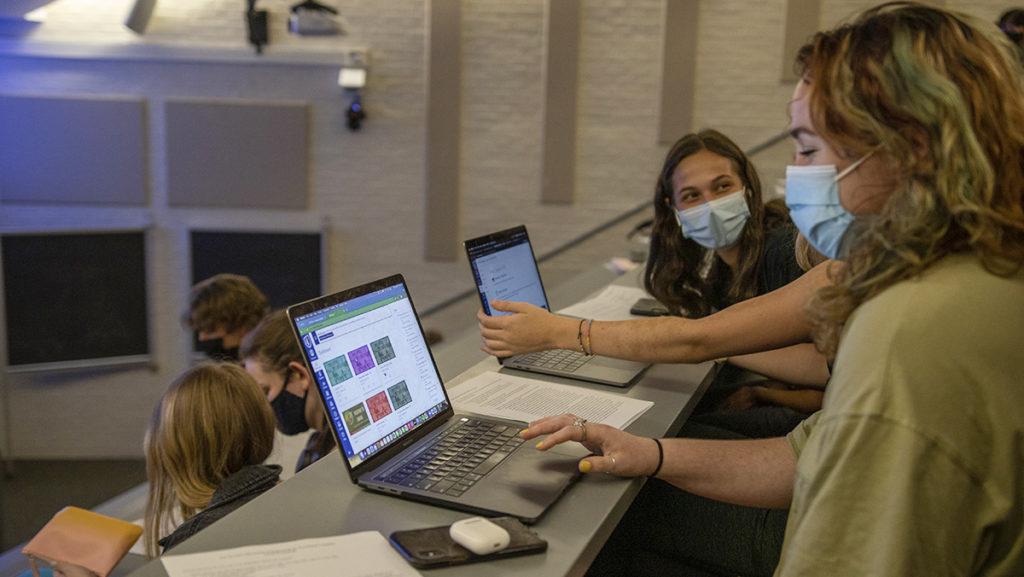Some members of the campus community are still adjusting to Ithaca College’s new learning management system (LMS), Canvas, following the end of the college’s 10-year contract with Sakai.
The process to switch LMSs at the college started approximately a year ago, Chief Information Officer, David Weil said. The transition involved communication and collaboration with multiple groups across campus, including students and faculty. Aug. 23 marked the official launch of Canvas for the campus community.
“Early last fall, we started to have conversations when we knew that Sakai had been around for nine or 10 years, and we felt –– especially in a hybrid environment, and as we were looking toward the future –– that Sakai was probably not going to be the right learning management platform for us as an institution,” Weil said.
During the height of the COVID-19 pandemic, the college transitioned to a mix of remote and hybrid learning from Spring 2020 to Spring 2021. This forced students and faculty to rely on Sakai more than past semesters.
Jenna Linskens, director for Learning and Innovative Technologies and executive committee co-chair of the LMS Governance Committee, said Sakai had a lot of limitations and required a lot of involvement from the Department of Information Technology (IT) at the college.
“It was a very challenging system and it was costing the institution quite a significant amount of money to maintain that system and to have the staffing to support it,” Linskens said.
Students at the college also had issues with Sakai, namely the organization and layout of the LMS.
Weil said the college created a group during Fall 2020 with representatives from across the college — including the Student Government Council, administrators from the Office of the Provost, members of the Center for Faculty Excellence, students and faculty — to assess what LMS would be best for the college.
Matt Clauhs, assistant professor of music education and co-chair of the LMS Governance Committee, said the committee talked to other colleges that had transitioned away from Sakai and narrowed down the search to different possibilities before deciding on Canvas in early December 2020.
Weil said the college signed a ten-year contract with Instructure, the developer and publisher of Canvas, in January 2021 and started the implementation process in the spring semester with pilot programs.
“Some institutions, you know, take longer to do the implementation, some do it in the same timeline we did — we really felt it was important to do this fairly quickly,” Weil said. “But I don’t think that meant that we did it any less thoroughly. We had a lot of people involved in the process along the way.”
According to an article from eLearning Inside, the process to switch from an existing LMS to Canvas can take on average two years, taking into account the fact that institutions consult with all stakeholders and participate in a pilot study. In addition, the migration of old materials to Canvas can take six months to a year and a half on average.
Clauhs said he piloted Canvas over the summer with graduate students in the music education program and said the students found Canvas to be very user-friendly.
Junior Daisy Codallos-Silva said that this semester has been her first time using Canvas and that she has been finding the platform difficult to navigate, but is looking forward to learning more about it.
“I’m kind of embracing it as a new thing,“ Codallos-Silva said. “But I’ve just been playing around with it, hoping to get the hang of it.”
Sophomore Ryan Griswold said he also thought the switch to Canvas has been difficult, because he was used to using the setup on Sakai.
“It’s not like Sakai, where you could just click on something and it would be right there — there’s different tabs for each link,” Griswold said.
Linskens said Canvas offers a mobile app for students and faculty to use, as well as a higher level of customer support than Sakai. Canvas offers Canvas Support, a separate chat function where users can type in their questions and correspond with a Canvas representative in minutes. She said Canvas Support allows IT at the college to refocus its efforts elsewhere, rather than answer questions that Canvas Support can help with.
“It also is a time saver for faculty and students to be able to get their question answered within a matter of minutes, rather than waiting a whole day or more for somebody to get back to them,” Linskens said.
Clauhs said he found Canvas Support to be helpful when transitioning his materials over from Sakai to Canvas.
“I’ve probably used it at least 20 times where I’m working on a problem and a representative from Canvas is able to assist me, usually within minutes of a request,” he said. “And that’s just been fantastic. The college invested in making that 24/7 support available to faculty and students and I think it’s been really useful in this transition.”










